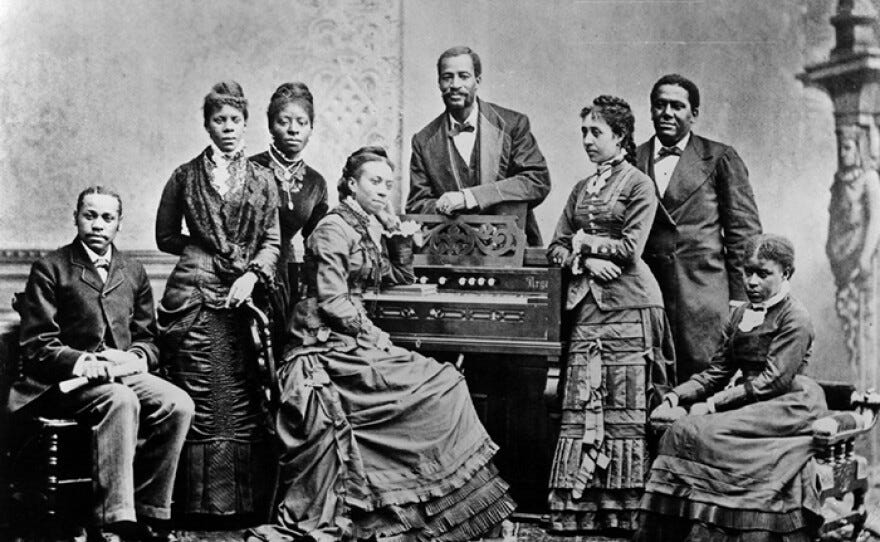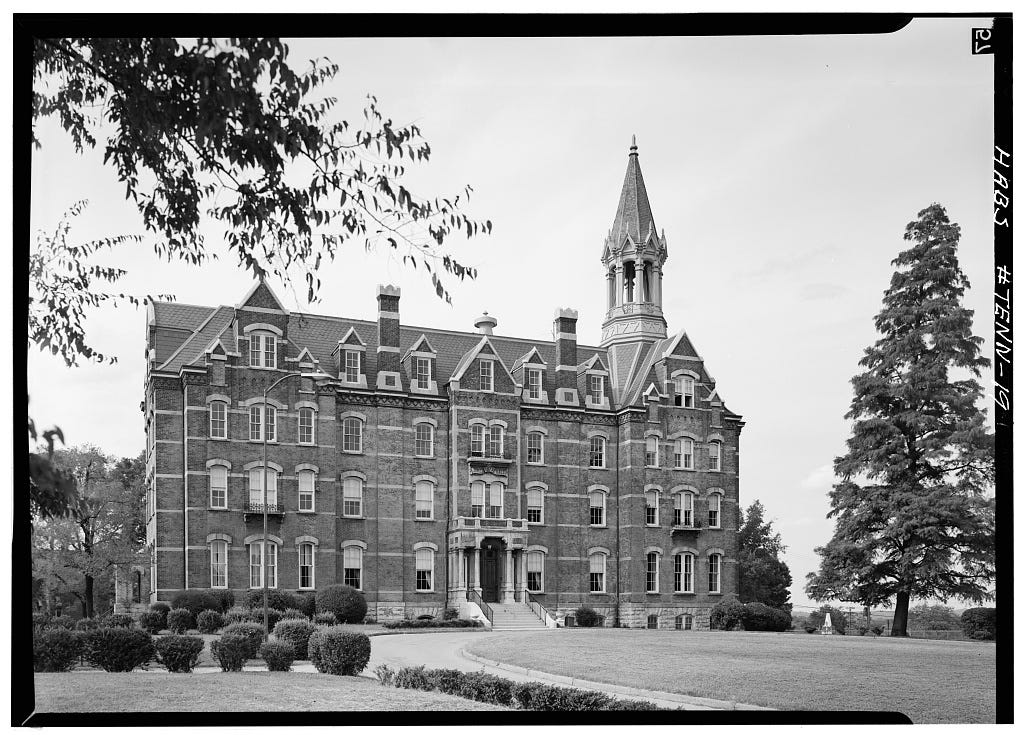The Jubilee Singers of Fisk University stand as a beacon of hope and a testament to the power of music to transcend barriers and forge a path toward freedom and understanding.
Their story is not just a chapter in the Black History of Music but a pivotal narrative that underscores the resilience, courage, and transformative power of a group of young singers who emerged from the shadows of slavery to captivate the world.
Integrating narratives from David Levering Lewis's "W.E.B. DuBois: Biography of a Race: 1868 to 1919," this essay explores the history and evolution of the Jubilee Singers, highlighting their profound impact on American music and society.
In the aftermath of the Civil War, Fisk University was established in Nashville, Tennessee, in 1866, as a beacon of hope for emancipated slaves striving for education and a better life. Given the financial turmoil Fisk was experiencing at that time, George L. White, Fisk's treasurer and music professor, conceived the idea of establishing a choral ensemble to raise funds for the university.
This group, initially composed of nine students, would later be known as the Jubilee Singers, a name derived from the biblical year of jubilee—a time of freedom and restoration.
The Jubilee Singers' journey began in 1871, a time when the wounds of slavery were still raw, and the struggle for civil rights was in its infancy. Armed with nothing but their voices and a profound sense of purpose, they embarked on a tour that was initially met with skepticism and racial prejudice.
However, their performances of Negro spirituals—a genre of music born out of the Black experience of slavery—quickly captivated audiences, transcending racial divides and earning them international acclaim.
David Levering Lewis, in his comprehensive biography of W.E.B. Du Bois, offers insights into the broader cultural and social impact of the Jubilee Singers. Du Bois, a towering figure of Black History, was deeply influenced by the legacy of the Jubilee Singers, seeing in their music a profound expression of the Black soul and struggle.
Lewis narrates how the Jubilee Singers not only raised significant funds for Fisk University but also played a crucial role in preserving and sharing the rich heritage of Negro spirituals, thereby contributing to the cultural and intellectual upliftment of Black Americans.
The repertoire of the Jubilee Singers, comprising songs like "Swing Low, Sweet Chariot," "Go Down, Moses," and "Wade in the Water," served as a vehicle for expressing the pain, hope, and resilience of the Black American spirit. These songs, deeply rooted in the Black experience, resonated with audiences around the world, breaking down barriers of race and class.
The Jubilee Singers' tours in the United States and Europe, where they performed before queens, kings, and commoners alike, not only garnered financial support for Fisk University but also fostered a greater understanding and appreciation of Black culture and the injustices of slavery.
It’s here where the legacy of the Jubilee Singers extends beyond their musical achievements. They played a pivotal role in challenging and changing societal attitudes toward Black Americans and their cultural contributions. Their success laid the groundwork for future generations of Black musicians and artists, paving the way for the Harlem Renaissance and the civil rights movement.
Through their music, the Jubilee Singers gave voice to the voiceless and brought to light the shared humanity that binds us all, regardless of race or background.As Lewis highlights in his biography of Du Bois, the Jubilee Singers' story is a powerful reminder of the role of art and culture in the struggle for justice and equality. Their legacy is a testament to the enduring power of music to inspire change and bridge divides.
In the heart of Fisk University stands Jubilee Hall, a lasting monument to the incredible journey and achievements of the Jubilee Singers. Erected in 1876, Jubilee Hall is the tangible outcome of the singers' tireless efforts and their successful tours across the United States and Europe.
As the first permanent structure built in the South for the education of Black students, it symbolizes a beacon of hope and progress in the face of adversity. Funded largely by the donations raised during the Jubilee Singers' tours, Jubilee Hall is not merely a building; it's a testament to the power of perseverance, unity, and the transformative impact of music.
With its Victorian Gothic architecture, it stands as a historical landmark, housing artifacts, and memorabilia that tell the story of the Jubilee Singers' extraordinary contributions to Fisk University and to the broader narrative of African American resilience and cultural heritage.
Jubilee Hall remains a central part of Fisk University's campus, serving as a reminder of what can be achieved when courage, talent, and determination converge, and continues to inspire students and visitors alike with its rich legacy.
Today, the Jubilee Singers of Fisk University continue to uplift and educate, carrying forward the torch of their predecessors and reminding us of the transformative power of music and the ongoing struggle for racial equality.
Through their music and legacy, the Jubilee Singers remain an inspiration to future generations, embodying the spirit of resilience and the unyielding pursuit of freedom and dignity for all.
Join Our Community Today
As a supporting member of "Black Books, Black Minds," you'll dive deeper into a world where your reading passions around Black History thrive. For just $6 a month or $60 a year, you unlock exclusive access to a close-knit community eager to explore groundbreaking authors and books.
You won't just flip through pages; you'll engage in meaningful conversations, connect on a more profound level with fellow book lovers, and enjoy VIP discussions with bestselling authors.
Plus, you'll receive handpicked book recommendations tailored for you. This is your chance to be at the heart of a community where literature bridges souls and authors share their secrets, all thanks to your support.
So join us today. Your participation and support are welcomed







Q: "Which musical group had the first international tour"?
A: "The Fisk University Jubilee Singers."
A real question asked on a recent episode of Jeopardy!
Thank you sir for this piece about not only my beloved alma mater and the moral courage and bravery of Fisk University's Jubilee Singers, who introduced the world to gospel music. Thank you for highlighting the work of my fellow Fiskite Dr. David Levering Lewis, 2X Pulitzer Prize recipient. As us Fiskites say, "her sons and daughters are ever on the altar." Again, much appreciation and thanks.
Years ago my husband bought me the four-CD collection Wade In the Water - a history of American American spirituals through 67 songs covering decades. Published by Folkways Recordings.
https://folkways.si.edu/wade-in-the-water-african-american-sacred-music-traditions-vol-i-iv/gospel/album/smithsonian